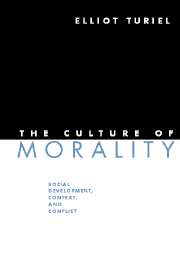Book contents
- Frontmatter
- Contents
- Preface
- 1 Introduction
- 2 Striving for Community
- 3 Discontents Revisited
- 4 Social Judgments and Social Contexts
- 5 The Development of Moral and Social Judgments
- 6 Social Thought and Social Action
- 7 Social Harmony and Social Conflict
- 8 Justice, Heterogeneity, and Cultural Practices
- 9 Social Hierarchy, Subordination, and Human Capabilities
- 10 Perspectives on Cultural Practices: More Than One
- 11 Subversion in Everyday Life
- 12 Conclusion
- References
- Index
7 - Social Harmony and Social Conflict
Published online by Cambridge University Press: 05 June 2012
- Frontmatter
- Contents
- Preface
- 1 Introduction
- 2 Striving for Community
- 3 Discontents Revisited
- 4 Social Judgments and Social Contexts
- 5 The Development of Moral and Social Judgments
- 6 Social Thought and Social Action
- 7 Social Harmony and Social Conflict
- 8 Justice, Heterogeneity, and Cultural Practices
- 9 Social Hierarchy, Subordination, and Human Capabilities
- 10 Perspectives on Cultural Practices: More Than One
- 11 Subversion in Everyday Life
- 12 Conclusion
- References
- Index
Summary
Do people generally cooperate with each other in harmonious relationships or are they most often in conflicts and disagreements with each other? Throughout this book, I have tried to show that social life encompasses many things, with areas of cooperation and harmony, as well as areas of conflict, disagreement, and struggle. I have also considered the variations that exist in individuals' social thinking and in their actions. Those variations are of a systematic kind, involving the application of different domains of judgment to different types of social situations. The evidence and theoretical approach I have presented are not in accord with the presumption, discussed in previous chapters, that we can speak of attitudes or orientations toward society in general. Social judgments and actions are sufficiently varied and flexible, so individuals cannot be portrayed as possessing general character traits or as reflecting a general type of national character.
In previous chapters, I also touched upon these issues with regard to culture. It is in cultural analyses that we see the most comprehensive efforts at explaining social life as entailing cohesiveness, consistency, and social harmony. Indeed, the societal and cultural perspectives of early twentieth-century scholars like Durkheim and Benedict are good examples of the view that social life involves accommodation to collective or cultural patterns that hang together in cohesive ways, and that, as a consequence, social life is usually not a struggle for individuals.
- Type
- Chapter
- Information
- The Culture of MoralitySocial Development, Context, and Conflict, pp. 152 - 180Publisher: Cambridge University PressPrint publication year: 2002



